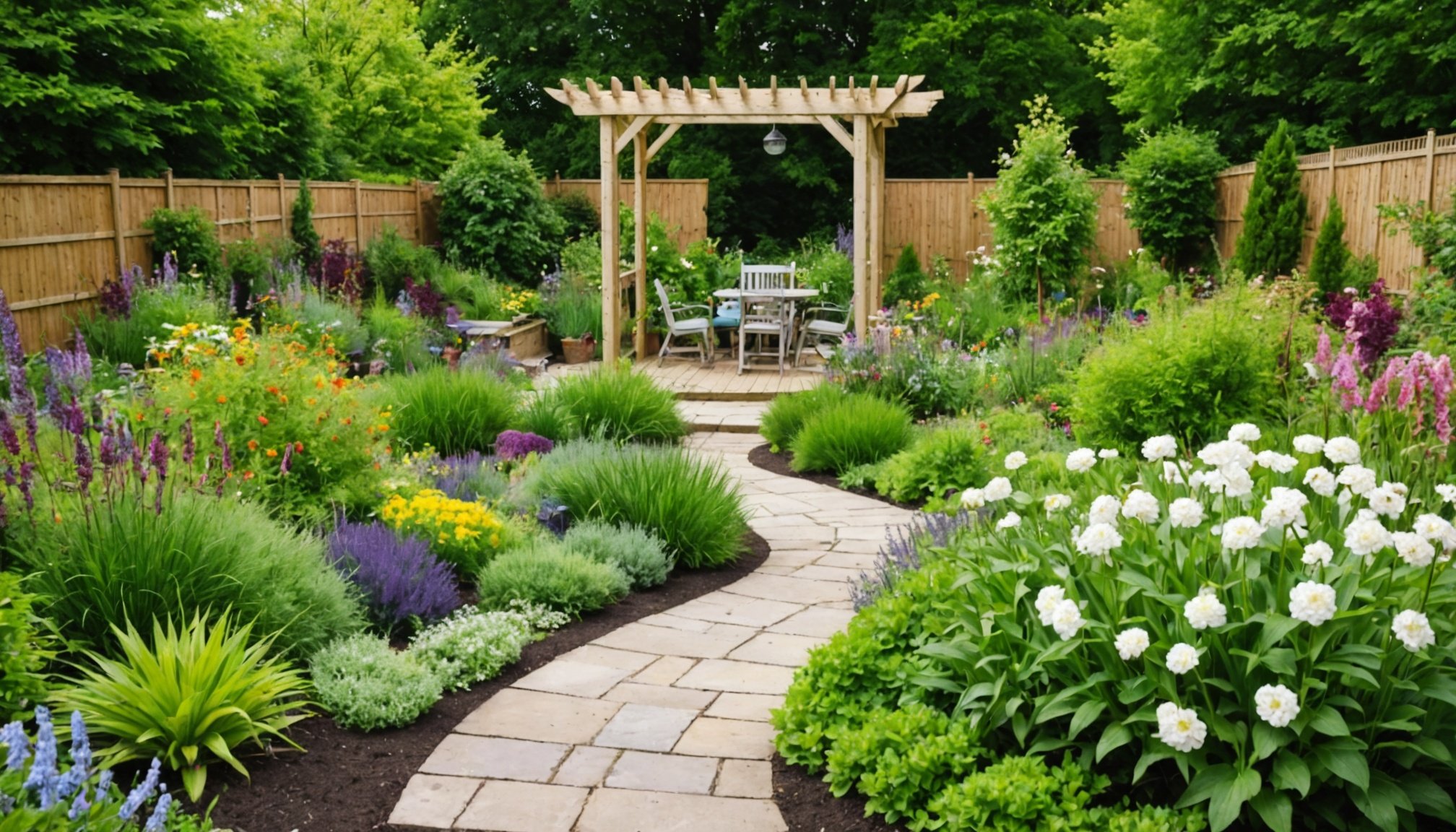Practical First Steps for an Eco-Friendly UK Garden
Starting with beginner eco-friendly gardening involves a clear plan based on your garden’s conditions and environmental goals. Assess your soil type, sunlight exposure, and water availability to align with eco-garden basics. This helps set achievable targets, such as attracting pollinators or reducing water usage.
Choosing UK-native plants is one of the most impactful sustainable gardening tips UK residents can adopt. Native species support local wildlife, require fewer resources, and thrive naturally in the UK climate. For example, plants like foxglove or bluebell not only beautify your garden but also nurture biodiversity.
In parallel : What are the benefits of using rainwater in your UK garden?
When sourcing materials, focus on local and sustainable options to lower your garden’s carbon footprint. Reusing wood, stone, or incorporating reclaimed items respects eco-gardening principles. Avoid imported plastics or chemically treated materials whenever possible. This approach complements the eco-garden basics by promoting resource efficiency and supporting local suppliers.
To improve success, document your garden’s ecosystem changes. This practice guides adaptations and increases sustainability over time. With these first steps, beginning your sustainable gardening tips UK journey becomes both manageable and rewarding.
Also to discover : How can you effectively manage pests in your UK garden naturally?
Enhancing Biodiversity and Supporting Wildlife
Creating a wildlife-friendly garden UK starts with thoughtful native planting. Incorporating wildflower borders provides essential nectar sources that attract pollinators like bees and butterflies. These pollinators play a crucial role in maintaining healthy ecosystems. Planting native hedges offers shelter and food for birds, further boosting garden biodiversity.
Building structures such as insect hotels and bird boxes adds to the garden’s habitat variety. Insect hotels provide safe overwintering sites for solitary bees and beneficial insects, while bird boxes support nesting, helping maintain local bird populations. Creating mini-habitats, such as log piles or small ponds, encourages diverse wildlife to thrive.
Equally important is avoiding chemical pesticides and herbicides. These chemicals can harm beneficial insects and disrupt natural balances. Using organic alternatives supports pollinators and other wildlife without compromising plant health.
By focusing on native planting, structural habitats, and chemical-free gardening, any garden in the UK can become a haven for wildlife. This approach not only enhances biodiversity but also fosters a dynamic, self-sustaining environment that benefits both plants and animals.
Water Conservation Strategies in the UK Climate
Water conservation in the UK requires practical approaches tailored to its temperate weather patterns. One effective method is rainwater harvesting. Installing rainwater harvesting systems or water butts allows gardeners to collect rainfall, which can be used for watering plants, significantly reducing reliance on mains water. These systems are particularly efficient during wetter periods, making stored water available during drier spells.
Choosing the right plants is equally vital. Incorporating drought-resistant plants in the UK that thrive with minimal supplemental watering can reduce water demand. Plants such as lavender, sedum, and certain ornamental grasses are well-adapted to UK soil and climate conditions, offering both beauty and sustainability.
Other eco garden water saving methods include mulching and smart soil management. Applying mulch around plants helps retain moisture, reducing evaporation and cutting watering frequency. Soil improvement through organic matter increases water retention, further supporting plant health with less water input.
Implementing these water-saving strategies supports both the environment and your garden’s vitality, demonstrating how well-planned tactics suited to the UK can conserve water effectively.
Sustainable Soil Management and Composting
Composting UK gardens is a cornerstone of organic soil health. Starting a compost bin or heap tailored to the UK climate means balancing green and brown materials—garden clippings, vegetable scraps, and dry leaves—to create nutrient-rich compost efficiently. This eco-friendly practice returns valuable organic matter to the soil, promoting healthy structure and biodiversity.
Choosing peat-free soil amendments is vital for eco-conscious gardeners. Peat extraction harms delicate ecosystems, so opting for alternatives like coir, leaf mould, or wood fibre supports sustainable soil management. These peat-free options improve moisture retention and aeration without environmental cost.
Natural fertilisers UK gardeners prefer include well-rotted manure, seaweed, and garden compost. These provide essential nutrients slowly and sustainably, reducing reliance on synthetic chemicals. Applying such organic fertilisers regularly maintains soil vitality while supporting microorganisms crucial for nutrient cycling.
Techniques to maintain soil health focus on minimal disturbance, crop rotation, and cover cropping with legumes or grasses. These methods prevent depletion, protect from erosion, and enhance nitrogen fixation, fostering a resilient garden ecosystem. Using composting UK gardens alongside peat-free and natural fertilisers creates a harmonious, eco-friendly gardening strategy that is both productive and sustainable.
Sustainable Choices for Garden Materials and Products
Choosing eco-friendly garden products UK is a cornerstone of sustainable garden design. Opting for garden furniture and tools made from recycled or FSC-certified wood ensures that your garden promotes responsible forestry practices. These materials reduce deforestation and lower the environmental footprint associated with production.
Many gardeners now prefer recycled garden materials not only for their environmental benefits but for their durability and charm. Items like reclaimed wood, stone, and metal can be reused creatively to construct raised beds, borders, or garden paths.
Another vital aspect is avoiding conventional plastics by selecting biodegradable pots and natural mulches. These alternatives break down naturally, enriching the soil instead of contributing to long-lasting waste. Materials such as coir, bark chips, or leaf mould provide excellent soil moisture retention while supporting soil health.
The concept of upcycling transforms everyday items into unique garden features. For example, repurposing old pallets into planters or seating combines sustainability with originality. Such approaches align seamlessly with sustainable garden design, turning waste into functional beauty.
By embracing these sustainable garden design strategies, you contribute directly to reducing environmental impact while enhancing your garden’s aesthetics and functionality.
Eco-Garden Maintenance and Long-Term Benefits
Maintaining an eco garden requires adopting low-maintenance eco garden tips that prioritize natural processes and reduce reliance on chemicals. Sustainable garden care focuses on nurturing soil health, encouraging biodiversity, and using organic mulches to suppress weeds. These practices not only minimize the need for watering and fertilization but also foster a thriving habitat for beneficial insects and pollinators.
Balancing garden aesthetics with ease of maintenance is crucial for year-round sustainability. Choosing native plants adapted to local climate reduces water usage and pest issues, enabling your garden to flourish with minimal intervention. Additionally, incorporating drought-resistant species and perennial plants can keep your garden vibrant while cutting down on upkeep efforts.
The wider environmental impact of gardening sustainably extends beyond your property. Eco-gardening supports local ecosystems, strengthens soil carbon storage, and conserves water resources. By reducing chemical runoff and enhancing pollinator habitats, it contributes to overall biodiversity and helps mitigate climate change effects in the UK.
Adopting these sustainable methods ensures your garden remains beautiful and environmentally friendly over time, creating a rewarding and responsible gardening experience.







